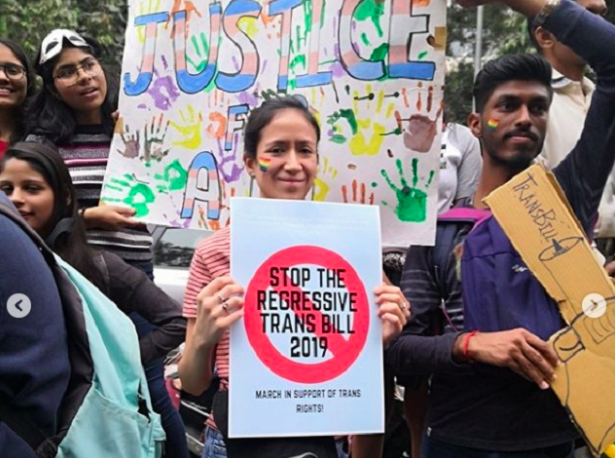This Article is written by Aman Garg, 2nd-year Law student pursuing B.A. LLB. at Gujarat National Law University.
Table of Contents
Introduction
After almost 5 years when the Supreme Court recognized transgender as a third gender and more than a year after it decriminalized Section 377 of IPC, the President on Friday carried the legacy forward by signing the Transgender Persons (Protection of Rights) Bill, 2019. At the outset, the Bill seeks to make considerable progress to protect the rights of the Transgender Community by prohibiting discrimination against them with relation to education, employment, healthcare, access to government or private establishments, right to movement and so on. It acknowledges ‘Transgender’ as a distinct identity and further recognizes various offences against the community. Besides it also mandates for the establishment of National Council for Transgender Persons to look after the grievances of the Transgender people.
Despite these encouraging provisions, the transgender community has taken a vehement stand against the bill, with activists even calling it ‘draconian’ and ‘in violation of the Fundamental Rights’. This article reasons as to how the bill, instead of conferring rights to the transgender community, effectively legalizes the atrocities committed on them and continues to remain a sheer mockery.
Discrepancies in the definition of ‘Transgender’
Transgender are usually born with typical male or female anatomies but feel as though they’ve been introduced into the “incorrect body” as compared to Intersex people whose anatomy is not typically male or female as there is something ‘uncommon’ about their bodies. All Transgender people have an “internal encounter of gender identity” whereas only a limited number of intersex people experience these problems as the majority of them identify themselves as male or female rather than transgender or transsexual. The Bill, by including the Intersex community in the definition of Transgender, erroneously presumes that all persons with intersex variations identify themselves as transgenders. This is absolutely inappropriate as it dilutes the recognition and rights of the Intersex community.
Right to Self-determination
The Supreme Court in the landmark judgement NALSA v. Union of India (2014), held ‘Self-determination of gender to be an integral part of personal liberty under Article 21.’ Considering the above judgement, the Bill erodes the right of Self-determination as it requires transgender persons to obtain a “Certificate of Identification” from the district magistrate so as to be recognized as a Transgender and enjoy the rights of the bill and an updated certificate may be obtained only if the individual undergoes surgery to confirm their sexual orientation. These provisions are in direct violations of the principles laid down by the Supreme Court in NALSA judgement, that any requirement for SRS for declaring one’s gender is dishonourable and unconstitutional. Besides, these provisions are also antithetical to Global standards for legal gender identification, including United Nations agencies, the World Medical Association, and the World Professional Association for Transgender Health– that directs for severance of legal and medical procedures of gender identification for transgender people. Furthermore, if a transgender person is refused ‘Certificate of Identity’, the Bill does not dispense recourse for appeal or review of such decision. Thus in the name of granting rights to the community, they are being further exposed to institutional persecution dehumanizing their bodies and their identity.
Inconsistencies with Domestic Laws
The Indian Penal Code was amended in 2013 to recognise specific offences against women, including acid attacks, sexual harassment, voyeurism, stalking and disrobing. While transgender people frequently encounter such equivalent offences, and distinct abominations including coerced gender conventionalism, hormonal treatment and surgeries, stripping, etc., the Bill does not fully recognise the same and does not furnish for punishment commensurate with their gravity. In case of any ‘Sexual abuse against Transgenders,’ the Bill stipulates maximum punishment of only 2 years, as opposed to a minimum of 7 years for ‘Sexual offences against women’. While prescribing different punishments for the same offence based on gender identity, the Bill does not stand up to the test of ‘Equality’ and thus violates the constitution itself.
Civil rights and Social Security
Taboo and social stigma have made Transgenders’ admission in education institutes almost prohibitive and have forced them to earn their livelihood through sex work, begging and dancing at events and thus it becomes crucial to provide them with education and employment opportunities. However, the bill is silent on granting opportunities of any kind to the community despite NALSA judgement directing the Govt. for affirmative action measure.
Although the bill promises “inclusive education and opportunities”, it does not provide any roadmap for the same and falters in recognizing early stages of a transgender’s life. Will the Govt. educate existing teachers to help them inculcate inclusive methods of teaching or will it create a distinctive post for Transgender educators in every educational institute? Will, there be a change in school and college curriculums to make it comprehensive about LGBTQ+ Rights or will there be scholarships to the community at all levels of education for more prominent access to education?
Another contentious issue is that, even after a historical judgement of the Supreme Court striking down the sodomy law and upholding privacy and consensual same-sex relations of LGBT community, the bill does not talk about civil rights like marriages, adoption, Succession, inheritance of property etc. which are significant to Transgenders’ lives and reality. Moreover, the bill unjustifiably neglects the atrocities and viciousness that transgender encounter within the family itself by debarring them from leaving the family and joining the trans- community, else be placed at a ‘rehabilitation centre’, which is a flagrant infringement of their fundamental right to be part of any association and reside in any part of the country. In fact, the word ‘rehabilitation’ is disempowering and patronizing as what transgender really need is recognition and housing assistance and not reclusion from society.

National Council for Transgender Persons
The Bill advances a ‘National Council for Transgender Person’ to advise the central govt. on legislation pertaining to the Transgender community, monitor such policies and review their impact on the community. With that being said, the proposed council is an unfettering joke on the aspirations for a responsible and accountable oversight body as it hordes a slew of 33 members with a limited representation of only 5 transgenders, leading to loss of democratic representation and engendering endless ‘confusion worse confounded’ among the numerous members. Further ambiguity pervades in the council as no guidelines are provided for redressing the grievances of the community. Will the council assist the transgender in approaching the court or is it empowered to punish the perpetrator independently? With the establishment of a National council and not State councils, the bill has also utterly disregarded ‘Geographical remoteness’ and ‘accessibility of resources’ as contributing factors in approaching the Council for redressing their grievances.
Conclusion
On one hand where the Courts are persistently endeavouring to uphold the rights of LGBTQ+ Community, on the contrary, the legislature is diluting the same by introducing bills incongruous to its very aspiration. It is high time the Govt. realize that laws should be in accordance with the landmark judgement of the Supreme Court on Transgender rights; else the community will continue to face problems ranging from social exclusion to discrimination and no progress would be achieved even after the enactment of the debilitating law.
Students of Lawsikho courses regularly produce writing assignments and work on practical exercises as a part of their coursework and develop themselves in real-life practical skill.
LawSikho has created a telegram group for exchanging legal knowledge, referrals and various opportunities. You can click on this link and join:
https://t.me/joinchat/J_0YrBa4IBSHdpuTfQO_sA
Follow us on Instagram and subscribe to our YouTube channel for more amazing legal content.
 Serato DJ Crack 2025Serato DJ PRO Crack
Serato DJ Crack 2025Serato DJ PRO Crack










 Allow notifications
Allow notifications


